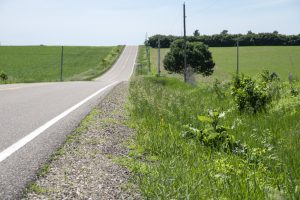During the past 10 years, pollinator species such as monarch butterflies and other wildlife have declined due to the loss of native habitats from increasing development, intensive agricultural practices, and greater use of pesticides. Roadsides, in particular, have grown in importance as a refuge for pollinators.
Washington County public works staff, in collaboration with the Washington Conservation District, are testing four different methods of site preparation and seeding to determine which is the most effective and efficient way to increase floral resources for pollinators along roadsides. Those methods include application of various conventional and organic herbicides, mowing, and broadcast seeding.

Washington County received a $5,000 grant through the Local Road Research Board’s Local Operational Research Assistance (OPERA) Program for the project team to purchase 22 pounds of seed for the three-year project. The team designed the seed mix specifically to provide nectar for pollinators during the spring, summer, and fall. In addition, the seed is readily available at most native plant retailers and costs less than $500 per acre.
-This article originally appeared in the September issue of the LTAP Technology Exchange.